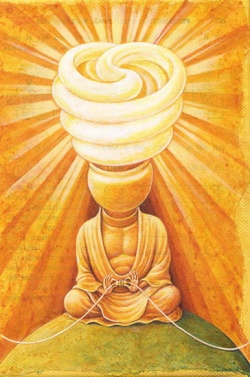Three Robes
The Pali term "ticīvara" means "three robes", that is to say the robe of the bottom (antaravāsaka), the upper robe (uttarāsaṅga) and the double robe (saṅghāṭi).
"ti" = "three pieces"; "cīvara" = "robe (utilised by a bhikkhu)"
The bhikkhu who confines himself to utilise only three robes is called a "tecīvarika". When this practice is appropriately carried out, with steadiness and diligence, with the determination of not to break it, we say that there is "tecīvarikaṅga " (spirit underlying a use limited to three robes).
The bhikkhu who adopts the dhutaṅga tecīvarika must, apart from his three robes, renounce to any other piece of cloth whose surface corresponds to the one of a cloth requiring a determination (thus a minimum of a cubit and a span in length by a span and six phalanxes in breadth).
